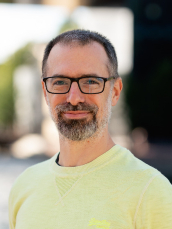Horizon Europe
With Horizon Europe, the European Commission (EC) aims to boost science and innovation in Europe. Horizon Europe finances research and innovation projects, both small-scale and large-scale and aimed at both fundamental research and market-focused development. With this programme, the EC aims to challenge the industry and the academic world to join forces in the search for solutions to European societal issues. A total of €95.5 billion is available.
Horizon Europe is the successor to Horizon 2020, which aimed to secure Europe’s international competitiveness, stimulate economic growth, and create jobs.
The UG and Horizon

At the UG, several researchers carry out their projects with grants from Horizon.
Prof. Davide Grossi (Faculty of Science and Engineering), has been awarded the grant to improve technology used in democratic processes. Grossi is working in this research project with an international and interdisciplinary consortium of six academic partners and three civil society partners. They will develop evidence-based methods by analysing and testing existing open-source software to design, assess, and validate online participation platforms. With their interdisciplinary approach, the consortium integrates methods and concepts from democratic theory, social sciences and computer science. The importance of this: ‘Democracy is complex. There is no single academic discipline that can tame this complexity alone' said Grossi.
Besides Grossi, Prof. Martien Kas has also received Horizon Europe funding.

Prof. Martien Kas is coordinator of the PRISM2 project that, partly on the basis of Horizon 2020 funds, is researching the biological causes of Alzheimer’s disease, schizophrenia, and depressive disorders. A total of 14 research institutes and companies are working ogether on the PRISM2 project. The aim of this research is to identify quantitative biological characteristics that occur in all three medical conditions. This would offer the possibility to develop focused treatments, regardless of the traditional diagnosis. The ability to grasp the biological causes of psychological disorders before clinical onset has long been a ‘holy grail’ for neuroscientists, as this offers the possibility of early diagnosis and focused treatment.
| Last modified: | 23 October 2024 3.35 p.m. |
